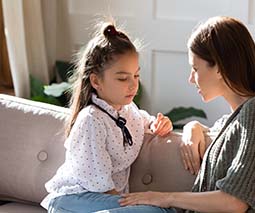Why ‘lighthouse parenting’ makes perfect sense (and 6 ways to get started)

Hot on the parenting trend heels of tiger moms, helicopter parents and free-range families, the ‘lighthouse parent’ philosophy is garnering attention for its adventurous yet sensible approach.
‘But what the heck is lighthouse parenting?!’ we hear you ask. Let us tell you more …
Shine, shine, shine!
The term ‘lighthouse parent’ was first coined by US paediatrician, Kenneth Ginsburg and is used to describe a considered, optimistic approach to raising kids.
“I like to think of myself as a lighthouse parent, you know reliably there, totally trustworthy, making sure he doesn’t crash against the rocks, but committed to letting him learn to ride the waves,” Ginsburg explains.
In his book Raising Kids To Thrive, Dr Ginsburg says that the watchful yet trusting approach of ‘lighthouse parenting’ results in strong, compassionate, resilient kids. It’s an ethos we can adopt when our kids are very little and adjust accordingly and appropriately as they grow.

Avoid the extreme
“Extreme models of parenting are not the way to raise your kids. Love, protection, and letting your kids learn from failure – that’s how people grow,” Ginsburg told 6ABC.
So how can parents guide their kids towards adulthood, ‘lighthouse parent’ style without curbing their independence, or conversely letting them free-range themselves into some kind of kid disaster?
Here’s a bunch of simple ways to get started.
6 steps towards lighthouse parenting
1. Unconditional love
Ginsburg believes that unwavering, unconditional love is the most important factor in a child’s life, helping kids to navigate tough times in the knowledge that parents will back them up, no matter what.
Adopting a careful, caring approach to your child’s behaviour, regardless of circumstances is the vital backbone of the lighthouse parent.
Be there, no matter what. Try not to freak out when things ‘go wrong’. Keep your emotions in check and deal with issues in a calm, compassionate manner.
2. Realistic, high expectations
Unconditional love doesn’t go hand-in-hand with mediocrity, however. Dr Ginsburg suggests keeping the bar high when it comes to your expectations of your child.
“Unconditional love has to be coupled with high expectations for effort, character and morality,” he explains. “Otherwise, a child will feel nurtured, but not learn to hold himself to high standards.”
Expect the best of your child and when things go awry, discuss it in an age-appropriate way without judgement.
3. Strike a balance
Protect your child by all means, but don’t wrap them in cotton wool. A little loosening of the apron strings coupled with some canny risk assessment is key.
“A child will never learn life’s lessons if he is protected from experiencing them. This point has to be tempered with the fact that children need protection from challenges that can bring irreparable harm,” Ginsburg advises.
4. Teach self-awareness
Helping your child to be mindful of how they are feeling, and teaching them how to cope with confusion, frustration, sadness, anxiety and other tricky responses is a big part of this resilience-based parenting strategy.
Simple kid-friendly mindfulness exercises, slow and deep breathing techniques, basic meditation and ‘naming’ feelings and talking them through are all super helpful.
5. Make friends with ‘failure’
As much as we all want our kids to achieve everything they set out to, it’s important to let them approach some challenges independently and navigate the various ups and downs.
Winning and losing both have their gains and lighthouse parents trust their kids to explore in their own way and support them whatever the outcome. Perfection is never the end game.
6. Encourage communication
Making time to talk through the things that are happening in your child’s life, both positive and negative, sets them up for easier exchanges with those outside your family and friends unit.
The more you talk to and with your child about the things going on around them, the better prepared they will be for more independent adventures.

Free to figure it out
Dad Brian Gresko is a fan of the lighthouse parent approach. Writing for parenting site, Babble he explains how he’s learnt to step back while keeping a watchful eye on son Felix.
“While he still has trouble socializing with other kids, he’s slowly but steadily figuring out how to use his words and work things out without resorting to violence,” Brian writes.
“Nowadays, I pick a spot, and keep a watchful eye while chatting with other parents. I don’t disengage from my fatherly responsibilities, I still take the offensive if I see trouble brewing.”
Balance is key
Dr Ginsburg suggests approaching our kids with the same positive expectations, chatty rapport and supportive home base that we mean to go on with.
We need to nurture them with all our hearts, but care enough to guide them towards being strong and sensitive people.
“When we raise kids in a balanced way, we’re gonna raise kids who are gonna be successful when they’re 35,” Dr. Ginsberg says.









